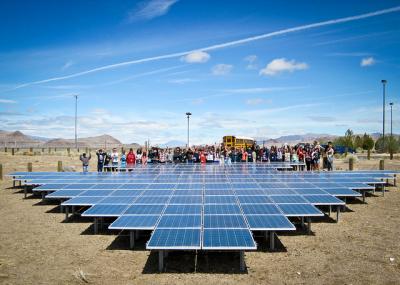The environmental movement has done a powerful job of bringing waste
and electricity use to the forefront of public consciousness over the
past few decades. Conservation actions like recycling, turning the
lights off, taking shorter showers, keeping the heat down, biking or
carpooling, and buying CFLs are routine actions in the lives of many
Americans. In addition to conservation measures, people can begin taking
powerful actions to address climate change with their money. Here are
four new opportunities for you to take powerful action right now and
make or save money in the process.
1. New Financing Models for Low Cost Home Solar
In the United States, there is a new home solar system installed
every four minutes. The collective residential solar capacity in the
United States is expected to double in the next two years. Plummeting
solar panel costs and new financing models are driving this rapid
expansion.
 Five
years ago, you needed $30,000+ if you wanted a sizable solar
installation on your home. Now, the major solar developers offer power purchase agreements (PPAs)
and solar leases; financing options that allow you to install solar for
$0-1000 down and pay off the cost of the system over 10-20 years with
the revenue generated by the electricity from the system. These
financing models now account for the majority of solar installations in
the United States. Unfortunately, 97% of Americans don’t realize how
cheap solar can be. If electricity prices continue to rise at current
rates, home solar will make economic sense for a growing portion of the
population.
Five
years ago, you needed $30,000+ if you wanted a sizable solar
installation on your home. Now, the major solar developers offer power purchase agreements (PPAs)
and solar leases; financing options that allow you to install solar for
$0-1000 down and pay off the cost of the system over 10-20 years with
the revenue generated by the electricity from the system. These
financing models now account for the majority of solar installations in
the United States. Unfortunately, 97% of Americans don’t realize how
cheap solar can be. If electricity prices continue to rise at current
rates, home solar will make economic sense for a growing portion of the
population.
2. Invest in Solar Projects
As grid electricity prices rise, and solar panel prices plummet,
solar is becoming an increasingly attractive investment. Major investors
have already invested in solar projects - Warren Buffett has over $5
billion in solar projects and Google has multiple $100 million projects.
If you want to invest like Buffett, Mosaic enables you to directly
invest in high quality solar projects. Historically, the only way to
invest in clean energy has been expensive home rooftop installations.
Mosaic is a platform for people to directly invest as little as $25 in
solar projects across the country.
How is this saving the planet? The World Economic Forum estimates
that we need an additional $700 billion in annual global investment in
“green” energy infrastructure if we are to have a realistic chance of
staving off seriously damaging climate change. Mosaic brings more
investment into the space by mobilizing investment from the crowd.
SolarCity made waves when they recently securitized $54 million in
solar project debt into investment grade assets. This opens a new avenue
of financing that can hopefully respond to the enormous growth in home
solar installations. While this investment pool is only open to
institutional investors, hopefully other companies will follow suit and
these securities will be made available to more investors in the future.
3. Buy an Electric Car
Another clean technology that has had prohibitive upfront costs is electric cars. But new evidence from EPRI indicates that
both hybrid and fully electric cars are cheaper over a 60-month
ownership period than conventional gasoline powered cars. Assuming $3.62
per gallon of gas, the Nissan LEAF costs $37,288 over a 60 month
period, while an average conventional car in the same class would cost
$44,949 with the same driving habits. Capital costs should come down as
more electric vehicles are bought and sold on the market, but the EPRI
report clearly shows that cost savings can be immediate. An electric
vehicle can even cut the payback period of a purchased solar
installation in half.
If cost isn’t your issue and you’re looking to save the planet in
style, Consumer Reports is calling the Tesla Model S the best car it has
ever tested with an overall score of 99/100. The car is also one of the
safest cars ever tested with a NHSTA 5 star rating in every possible
category. Unfortunately for most consumers, the Model S starts at around
$70,000.
4. Divest/Reinvest
The Fossil Free divestment movement is generating a national
conversation about the ethics of investing in fossil fuels. Recent
reports have found that endowments and pension funds typically have
around 10% of their money invested in fossil fuel assets or debt. A
number of colleges, cities, foundations and religious institutions have
already pledged to divest. A recent study from
Oxford University found that this is the fastest growing divestment
campaign in history. The campaign’s highly dramatized moral battles
could cause serious stigmatization of the fossil fuel industry; the type
that could cause restrictive legislation. 350.org also has a toolkit
for personal divestment on their website.
The other side of the coin is re-investing in green infrastructure.
Besides investment in solar projects, as mentioned above, equity in
clean energy companies could offer solid returns while supporting an
industry that is developing our clean energy economy.
The original article was published on Solar review's
No comments:
Post a Comment